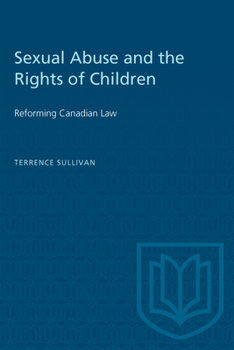Sexual Abuse and the Rights of Children: Reforming Canadian Law
The sexual abuse of children is an area of increasing concern to social services agencies, lawmakers, and the general public. Recent reforms of the legislation in this area have been influenced by the emerging field of children's rights. Terrence Sullivan takes a critical look at the reforms and raises provocative questions about who is empowered by developments and who is not.
The Canadian constitution potentially offers an important vehicle in advancing individuals rights. Sullivan reviews the emergence of child abuse and child sexual abuse as a 'new' object of social inquiry and regulation within the context of childhood sexuality, which has historically been subject to extensive regulation in the hand of professionals. He explores the rise of child sexual vulnerability on the public agenda, and tracks the role and influence of specialized professional knowledge in stimulating and steering legislative reform.
Sullivan concludes that court decisions and legislative reforms of recent years seem to reduce the authority of parents in favour of helping professionals. This trend, he argues, signals both a reduction of paternalistic authority within the family and a retreat to the arms of strangers - professionals who expand their influence and authority through state-sanctioned and state-compensated activity centered on children families. He argues for a more democratic law reform process which is not discussed solely through the indeterminate language of children's rights, but rather with the direct input of young persons and their families.





